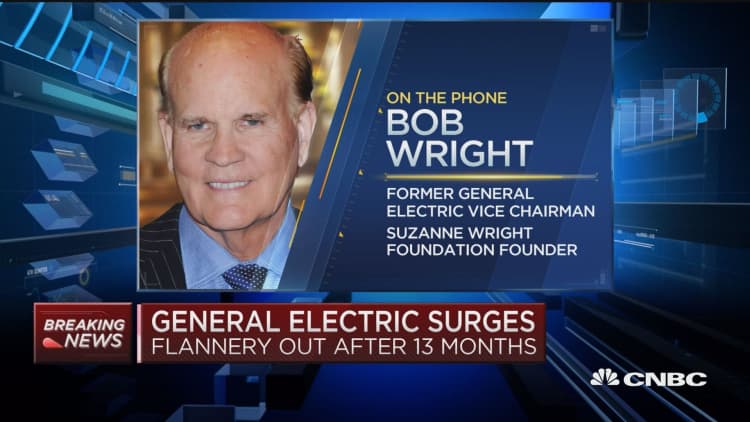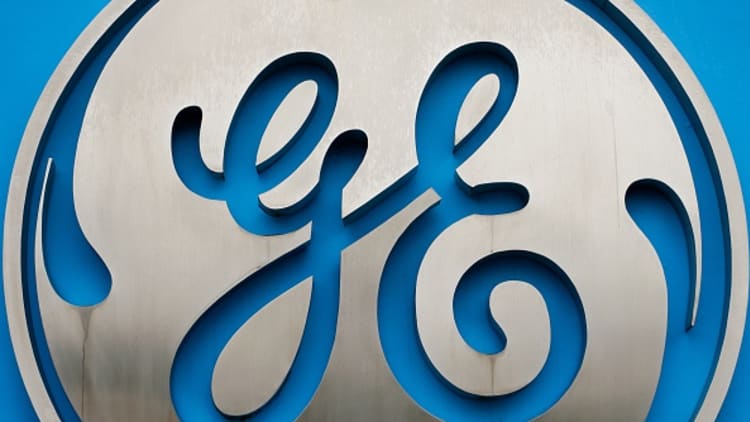
Struggling industrial conglomerate General Electric abruptly removed John Flannery as chairman and CEO on Monday after only a year on the job, and installed former Danaher CEO Lawrence Culp as his successor.
GE shares, which had fallen to a nine-year low last week, surged in reaction.
GE also announced a $23 billion noncash charge for its ailing power business and said it will "fall short of previously indicated guidance for free cash flow and EPS for 2018," as many on Wall Street had warned.
Flannery's removal was driven by the board's frustration with the slow pace of change under his leadership, and not driven by the power business woes, sources familiar with the issue told CNBC.
Culp, 55, was named to the GE board in April. He served as the CEO and president of Danaher from 2000 to 2014, during which he quintupled the size of the science and technology company.
GE shares closed Monday trading 7.1 percent higher at $12.09 a share, after jumping as high as $13.07 a share. Last week, the stock posted one of its worst weeks of the year, down 7 percent and hitting a nine-year low of $11.21.
Flannery, 56, was appointed August 2017, taking the helm from Jeff Immelt as the conglomerate's stock fell steadily. But GE's value had continued to erode, setting new lows as investors remain unconvinced by Flannery's turnaround plan. Fear of a second dividend cut for the widely owned blue chip company has also weighed on the shares. GE cut the dividend in half on Nov. 13, to 12 cents per share from 24 cents per share.
Last June, GE was kicked out of the Dow Jones Industrial Average. It had been the longest-serving component of the blue chip index — 111 years.
Despite Flannery's efforts, GE's stagnant power business has hit new roadblocks, such as a failure of a turbine blade at the Colorado Bend power plant in Wharton County, Texas.

Its board of directors met Wednesday to discuss how widespread the turbine failure was, according to The Wall Street Journal. Flannery reportedly reassured employees that the company's engineers had found a solution to the flaw and told staff to "fight for the company," saying media reports overplayed the turbine failure.
Read More: The CEO behind General Electric's health unit on cutting ties from struggling parent GE
GE's business of selling turbines to gas and coal-fired power plants had already been suffering in recent years as utilities ramped up construction of solar and wind farms. GE has also acknowledged that it misread the market, leaving it with large inventories of unsold equipment. In addition, the sales slowdown hurts the company's ability to make money by servicing the equipment.
"GE Power's current goodwill balance is approximately $23 billion and the goodwill impairment charge is likely to constitute substantially all of this balance," GE said Monday. "The impairment charge is not yet finalized and remains subject to review."
Previously, the company endeavored to shrink operational costs in the troubled power unit by about $1 billion, address operational problems and adjust the size of the business based on the needs of the market.
GE was worth nearly $600 billion in August 2000 — a time when it was one of the most valuable companies in history. Its valuation slipped over the first decade of Immelt's tenure as CEO before taking a sharp hit during the 2009 financial crisis. But GE's value recovered to prerecession levels nearly as quickly, reaching as much as $300 billion by December 2015. Yet shareholder confidence began crumbling sharply in January 2017, at about $31 per share.
– CNBC's David Faber, Andrew Ross Sorkin and Tom DiChristopher contributed to this report.



